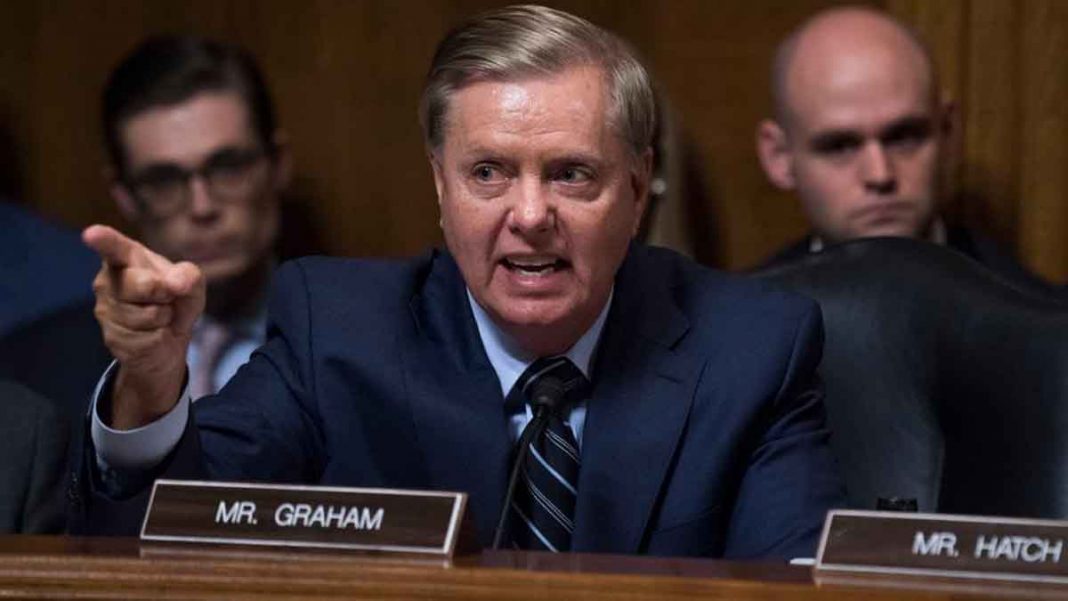A senior senator from the US, Lindsey Graham on Tuesday took to Twitter to call the US president’s decision to not reach out to the leadership of Pakistan as ‘stunning’.
The senator questioned this decision of the US leadership as the country is readying itself for withdrawal from Pakistan’s Western neighbor Afghanistan after 20 years of war.
He added to the thread, “How do we expect our withdrawal from Afghanistan to be effective without coordinating with Pakistan? Clearly, the Biden Administration believes that our problems in Afghanistan are behind us.”
Stunning to hear that President Biden hasn’t reached out to the Prime Minister of Pakistan Imran Khan regarding the U.S.-Pakistan relationship and Afghanistan.
— Lindsey Graham (@LindseyGrahamSC) June 22, 2021
The US senator termed this decision by the Biden Administration as ‘major disaster in making’, and he said that it would be worse than the blunder in Iraq.
I believe that this decision by the Biden Administration to withdraw all forces and not stay engaged with Pakistan is a major disaster in the making, even worse than the blunder in Iraq.
— Lindsey Graham (@LindseyGrahamSC) June 22, 2021
Imran Khan’s recent interview with the US news agency Axios has caused controversies on multiple levels, from international issues like Uyghurs being allegedly re-educated to stirring a discussion on the topics of gender equality and harassment of women in Pakistan.
However, one such controversy has been due to the mention by the Prime Minister of Pakistan that US President Joe Biden has not contacted him since he came to power.
In the interview, this issue came when the Axios interviewer Jonathan Swan asked the Prime Minister if he spoke to Mr. Biden since he took office. The premier replied, “No, I have not.”
“Is there a reason for that?” the interviewer asked. “Whenever he has time, he can speak to me. But now, clearly, he has other priorities,” the prime minister said.
Read More: Qureshi advices US to withdraw systematically from Afghanistan
Recently, Pakistan’s role in the smooth transfer of power in Afghanistan has been highlighted on many platforms.
In a recent interview with German publication Der Spiegel, Afghan President Ashraf Ghani said, “It is first and foremost a matter of getting Pakistan on board. The US now plays only a minor role. The question of peace or hostility is now in Pakistani hands.”
This statement has reportedly been echoing in the US’s legislative chambers recently as well. In May a congress meeting where lawmakers from both Republican and Democratic parties expressed concern about Afghanistan’s future after the withdrawal of American and NATO forces and deliberated on the key role that must be played by Pakistan in this regard.
In the meeting US’s chief negotiator on Afghan affairs, Ambassador Zalmay Khalilzad said, “The US, was trying to build a regional consensus and support for peace and that’s why the US “has repeatedly emphasized” the importance of this economic dimension of peace.
Replying to this a California Democrat and a former US Air Force colonel Congressman Ted Lieu said, “I am just curious about what happened earlier this year when 40 world leaders were invited to the climate summit, including the leaders of India and Bangladesh. And the leader of Pakistan was not invited, even though Pakistan is the fifth most climate-vulnerable country. Even though 35 of the 40 countries invited have populations smaller than Pakistan’s,” he said.
He added, “It seems to be disrespectful to not have invited the Pakistani leader to this climate summit when the leaders of India and Bangladesh were invited. And now we are asking Pakistan to help us, a lot, in Afghanistan. So, I am wondering what was the thinking (behind) that sort of exclusion of the Pakistani leader?”
It is worth mentioning that in April US president Joe Biden announced that the US would leave Afghanistan by the 20th anniversary of the terrorist attacks in New York and Washington, that is, on 11th September 2021.
The Pentagon remarked recently that the forces will complete their full withdrawal by September 11, but the space of the pullout could be slowed given the Taliban’s gains.
Read More: Can a democratic government in Kabul save Afghanistan?
US’s recent overlooking of Pakistan is going to cost the peaceful withdrawal of US forces from Afghanistan and smooth transition of the country to an independent sovereign state, as Afghanistan itself is looking towards Pakistan’s support if there is going to be any chance of stability in the region, as Afghan president wrote in Foreign Affairs on 4th May.














